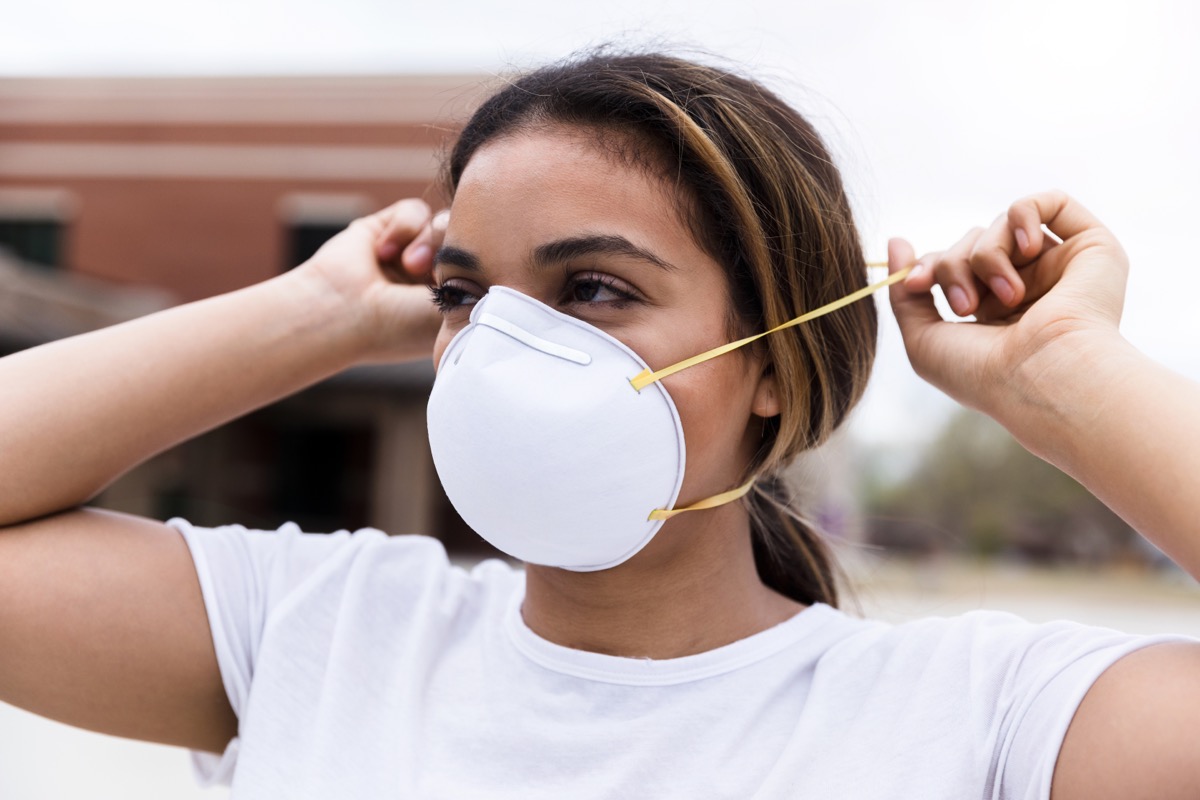The Omicron variant has changed the face of the COVID-19 pandemic. It's so contagious that it's pushed caseloads to record levels. Although it seems to cause milder illness and is less likely to result in hospitalizations, experts say it's still important to do your part to avoid contracting the virus and spreading it to more vulnerable people. So what symptoms indicate that you might be infected with Omicron and should self-isolate? Here's what doctors say Omicron usually feels like. Read on to find out more—and to ensure your health and the health of others, don't miss these Sure Signs You've Already Had COVID.
According to the scientists at the COVID Symptom Study, who have been tracking symptoms associated with new COVID cases, Omicron symptoms aren't appreciably different than those of the Delta variant. In fact, the five most commonly reported symptoms are the same. They include runny nose, headache, fatigue, sneezing and sore throat.
People who've contracted the Omicron variant have also frequently reported loss of appetite and brain fog, the researchers said. Another common symptom is back pain, CBS News reported, adding, "While the frequency of some symptoms may have changed with Omicron, doctors say there is no evidence of significantly different or new symptoms that have not been seen in previous COVID-19 cases."
One symptom that seems to be less common is loss of taste or smell, says UC Davis Health.

Experts basically agree that if you've been vaccinated, Omicron seems to cause less severe symptoms than previous variants. People who are unvaccinated seem more likely to experience symptoms that were common with COVID's first waves, such as shortness of breath, loss of taste or smell, and body aches. And they tend to have more severe illness. "If you look at the ones who're in the ICU or need to be on a ventilator, it's much more the unvaccinated," Dr. Matthew Sims, an infectious-disease expert in Michigan, told NPR this week.

According to the CDC, the most common symptoms of COVID-19 include:
- Fever or chills
- Cough
- Shortness of breath or difficulty breathing
- Fatigue
- Muscle or body aches
- Headache
- New loss of taste or smell
- Sore throat
- Congestion or runny nose
- Nausea or vomiting
- Diarrhea

Suspicions that the flu and COVID might merge to create a "flurona" epidemic didn't pan out. But Omicron is surging at the precise height of cold and flu season. So how do you tell if your cough, scratchy throat and sneezing is a cold, flu or COVID? You really can't, experts say. Their advice: If you're having any unusual symptoms, you should assume it's COVID. Get tested and self-isolate until you know the results.
If you test positive for COVID, the CDC now advises that you isolate for five days after the date any symptoms started (as long as your symptoms are improving and you've been fever-free for at least 24 hours without using any fever-reducing medications). If you test positive but don't have symptoms, you should isolate for five days from the date of your COVID test.
If you're unsure if you should seek medical care for your COVID symptoms, the CDC has published a "coronavirus self checker" that can help you determine if you need further treatment.

Follow the fundamentals and help end this pandemic, no matter where you live—get vaccinated ASAP; if you live in an area with low vaccination rates, wear an N95 face mask, don't travel, social distance, avoid large crowds, don't go indoors with people you're not sheltering with (especially in bars), practice good hand hygiene, and to protect your life and the lives of others, don't visit any of these 35 Places You're Most Likely to Catch COVID.
The post Omicron "Usually" Feels Like This, Say Doctors appeared first on Eat This Not That.
----------------
By: Michael Martin
Title: Omicron "Usually" Feels Like This, Say Doctors
Sourced From: www.eatthis.com/news-omicron-usual-symptoms-doctors/
Published Date: Tue, 01 Feb 2022 13:11:34 +0000
Read More
Did you miss our previous article...
https://naturesmart.us/fitness/how-shoveling-snow-affects-your-body-may-be-cause-for-concern
 HealthWellnessFitnessBeautyVideosPrivacy PolicyTerms And Conditions
HealthWellnessFitnessBeautyVideosPrivacy PolicyTerms And Conditions
